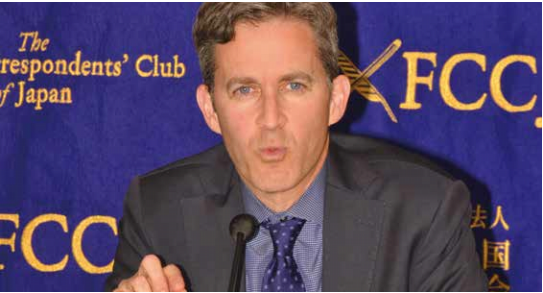Issue:
Monitors from the UN and Reporters Without Borders find Japan’s press facing increasing threats to independence
Media independence in Japan is under “serious threat” from the government, according to a senior UN official, who called for legislative changes and the abolition of the press club system to enable journalists to fulfill their watchdog role.
Speaking at the FCCJ on April 19, David Kaye, the UN’s special rapporteur on freedom of expression, said senior staff at media organizations were steering clear of certain issues that could cause discomfort to the prime minister, Shinzo Abe, and other senior politicians. “The independence of the press is facing serious threats: a weak system of legal protection, persistent government exploitation of a media lacking in professional solidarity,” Kaye said.
Newspapers and broadcast journalists told Kaye on condition of anonymity that they sometimes felt they had no choice but to exercise self-restraint in reporting sensitive issues such as the Fukushima nuclear disaster.
Kaye, who spent a week in Japan meeting journalists, government officials and pressure groups, cited the recent controversy surrounding the internal affairs minister, Sanae Takaichi, who warned that broadcasters that repeatedly failed to show “fairness” in their political coverage, despite official warnings, could be taken off the air. A clause in the broadcast law allows the internal affairs minister to suspend broadcasting that does not maintain political neutrality.
“This is a big problem . . . that the broadcasting act allows the government to regulate the media,” Kaye said. “And so is the suggestion that it could be used, like a sword of Damocles hanging over broadcasters, to suspend their licenses.”

David Kaye, the UN’s special rapporteur on freedom of expression, speaking at the Club
“I think the kisha clubs should be abolished . . .they’re a hindrance to media freedom in Japan”
KAYE SAID THE PRINT media felt similarly embattled, with management “encouraging” journalists not to cover sensitive stories or those that could stoke anger among government officials.
He said the kisha club system fostered an unhealthy relationship between journalists and the government and corporate bodies they cover, adding that it could be used as a conduit for applying pressure on journalists “that is difficult to resist.” “It is normal for there to be tension between the media and the government, but the way the Japanese media is structured doesn’t give journalists the opportunity to push back,” said Kaye, who will present a full report to the UN’s Human Rights Council next year.
“I think the kisha clubs should be abolished. They foster a kind of access journalism and undermine investigative journalism. I think they’re a hindrance to media freedom in Japan.”
Kisha clubs, however, are only part of the problem, Kaye added, pointing to reports of semi-clandestine meetings between Abe and senior media executives, and the lack of solidarity among journalists working for rival organizations. “The media bears some responsibility for the situation and has a role in putting it right,” he said. “The law and the media together can protect freedom of the press.”
Kaye’s appearance at the FCCJ came a day before publication of this year’s Reporters Without Borders’ world press freedom index, in which Japan came 72nd out of 180 countries, 11 places down from last year.
RWB said that the “latest disturbing sign of government pressure on the media” was NHK’s dismissal of presenter Hiroko Kuniya, “which has caused widespread dismay among journalists.” Her unscripted questioning of chief cabinet secretary, Yoshihide Suga, in July 2014 was cited as one of the reasons for the termination of her contract in March, RWB noted.
KUNIYA’S DEPARTURE CAME AROUND the same time as those of Shigetada Kishii, anchor of the “News 23” program on TBS, who had criticized the proposed security legislation, and Ichiro Furutachi, presenter of TV Asahi’s “Hodo Station,” known for giving government officials a rough ride.
RWB said Japanese media had become overly cautious since the state secrets act went into force in December 2014. The “rather vague” category of state secrets “is protected by a very harsh law that deters journalists from embarking on investigations,” it said. “The Fukushima nuclear disaster, the imperial family’s personal lives and the defense of Japan are all ‘state secrets.’”
The entry into force of the state secrets act, under which whistleblowers and journalists who cooperate with them face prison terms, was another example of the pressure Japanese journalists have faced since Abe took office in late 2012, Kaye said.
While no one has been prosecuted under the law, the suggestion that divulging any part of a large, eclectic and so far illdefined body of information deemed secret would automatically discourage journalists from digging around. “Government officials assured me that journalists would not be prosecuted,” Kaye said. “But they need legal protection, not political promises.”
Weaker protection for whistleblowers meant journalists would lose access to sources for important stories, he added. “In the long term, it is the people of Japan who suffer from lack of access to information.”
Kaye had been due to visit Japan last December, but officials in Tokyo abruptly canceled his trip, citing scheduling problems. He had requested a meeting with Takaichi during his visit in April, but was told that she was busy with her duties in the Diet.
Despite allegations on social media that Kaye had come with preconceptions fed to him by disgruntled foreign reporters, he said his encounters with Japanese journalists had given him genuine cause for concern. “I came here with an open mind . . . not a blank slate, but a willingness to be open to all perspectives,” he said. “Having spoken to journalists who feel under more pressure by the day, my concerns have grown stronger.
“Now is the moment for Japan to take steps to secure its independent media.”
Justin McCurry is Tokyo correspondent for the Guardian and Observer newspapers in London and principal Japan and Korea correspondent for Global Post.

